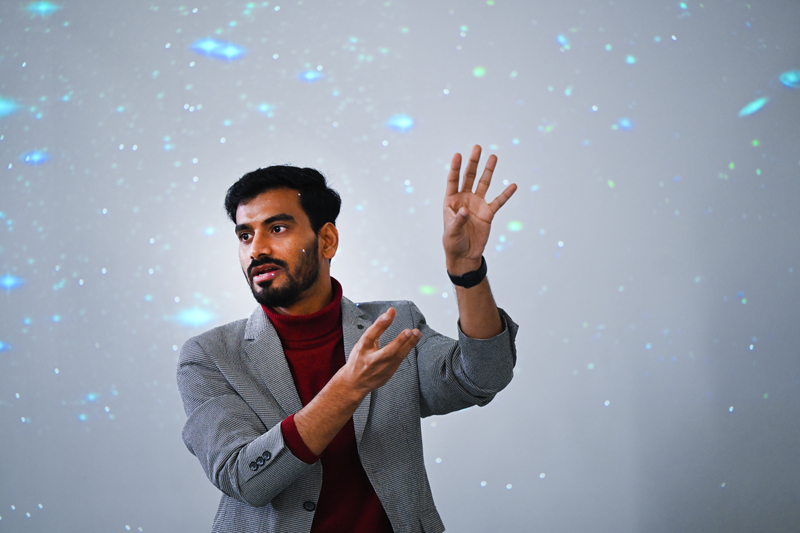Youth Month: Curiosity and continuous learning
26 June 2024 | Story Kamva Somdyala. Photos Lerato Maduna. Video Production Team Ruairi Abrahams, Boikhutso Ntsoko and Nomfundo Xolo. Read time 4 min.The University of Cape Town’s (UCT) Summer School initiative took its programme to Masiphumelele in Hout Bay on Saturday, 22 June, as two guest speakers spread the word about the discovery of anaesthesia and astronomy, respectively.
Celebrating 100 years this year, the Summer School programme offers a broad range of lectures and courses that appeal to young and old. It has grown and evolved over time, and this time, in collaboration with IkamvaYouth and sponsored by Coca-Cola Peninsula Beverages, it was students of, among others, Masiphumelele High School, Simon’s Town School and Ocean View High School who heard from retired professor of surgical research at UCT Anwar Mall and postdoctoral fellow in the Department of Astronomy at UCT Dr Abhisek Mohapatra.
“I love doing this. I feel it’s very important and I feel students in our schools don’t get enough exposure to scientific topics like the one I did. And the issue with that is they may have heard about science and probably do science in school, but they don’t know it’s application,” Professor Mall said after concluding his presentation.
His talk was centred around the fact that at one point in time there was no anaesthesia for people who were undergoing surgery. He anchored his talk on showing the students the value in continuous learning and advancements.
Curiosity
“I give talks like this which are historical [about the topic] but they are also motivational and what I try and show is how we as human beings over centuries have developed ideas about improving our lives. I was showing them how people used to have amputations and have their legs cut off without any anaesthetic and it must have been horrific and a lot of people who were ill did not want to have operations because of that and [I showed] gradually how these discoveries were made,” Mall said.
“I remember having an operation years ago and it was dreadful. After the operation I was sicker than before. I had the worst time. After a recent operation, I felt nothing; I was fine and never felt sick. The nice thing is that even what is correct today needs to be improved because there are always more and more questions that need to be answered, so the idea is to encourage young learners to think openly, be curious and ask questions.”
“We don’t instil curiosity in students.”
He added: “I’m also showing that [we shouldn’t] take things for granted and I find that’s one of the issues with our education system: we don’t instil curiosity in students. I came from an apartheid school, relatively rural and we just wanted to pass – to become a doctor or lawyer – but we never asked the question ‘Why?’ because we were not encouraged to think that way and so when I got to university, I struggled and, it is only when I started asking the ‘why’ that things started getting exciting. And the first ‘why’ turns into another and that feeds into the notion of continuous learning.”
Mall hailed the Summer School programme: “This is a very important programme. And having lectured at UCT’s Summer School for over a decade – and I speak on general science and medicine topics with a splash of history and philosophy – I find the importance of it is that it brings education to the public because the public wants to know.”

With a strong background in observational and theoretical astrophysics, Dr Mohapatra introduced students to the wonders of astronomy, and, at the end of his talk, his main takeaway was that there were more girls than boys in the audience. This is important for him in the field of astronomy because it shows that there is increased curiosity in science from young girls.
“They [students] looked very enthusiastic in learning about this topic. Astronomy is really growing in South Africa, in my opinion, and that helps and motivates people to join astronomy to take it as a specialised subject. With the growth of telescopic data, we of course need more people to join astronomy and do analysis. The more the merrier, [and] thanks to the internet, machine learning and AI [artificial intelligence], studying astronomy is becoming accessible and I feel that makes it easy to jump into it,” he said.
Lindokuhle Manana, a Grade 12 learner at Simon’s Town School, was grateful for the opportunity to be presented with “career guidance”, which will help her as she applies for university admission.
Masiphumelele High School learner, Ayeza Daweti – also in Grade 12 – felt programmes like the Summer School offering were helpful “because we meet experts who teach us about new things ... they are a great help”.
 This work is licensed under a Creative Commons Attribution-NoDerivatives 4.0 International License.
This work is licensed under a Creative Commons Attribution-NoDerivatives 4.0 International License.
Please view the republishing articles page for more information.



































































































































































































































































































































































































































































